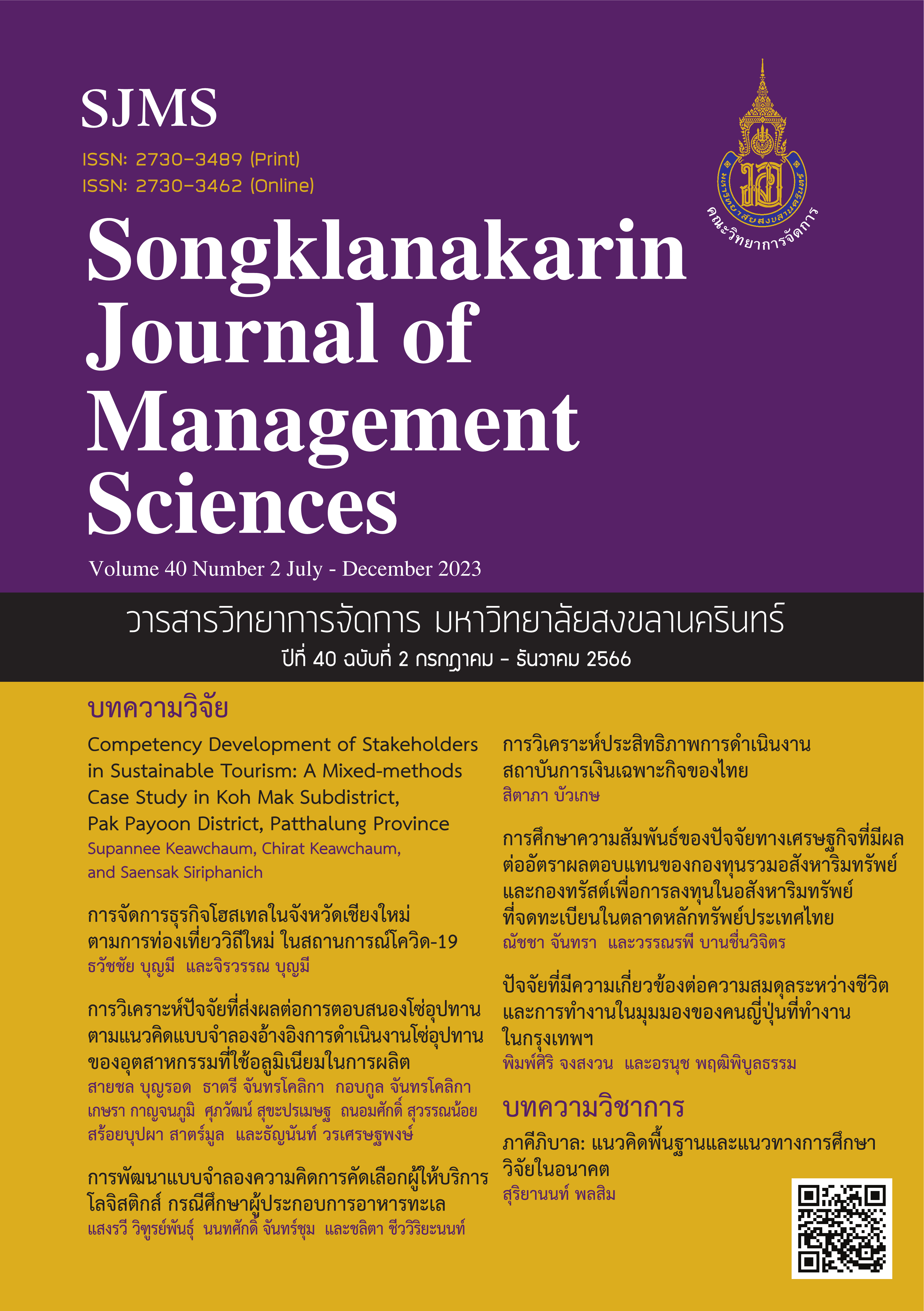Hostel Business Management Practice in Chiang Mai for the New Normal of Tourism during the Covid-19 Pandemic
Main Article Content
Abstract
The purpose of this research was to study the practice and its results of using the hostel business management practice in Chiang Mai Province according to the new normal of tourism during the covid-19 pandemic. Data was collected from 30 hostels located in Mueang District, Chiang Mai Province, through in-depth interviews with entrepreneurs. The data were examined through consistency checks, and the content was analyzed using a qualitative research synthesis technique and descriptive statistics such as frequency and percentage.
The results revealed that there were 3 aspects involving 12 practices in hostel management. The first aspect was increasing revenue, which involving lowering room rates price, and marketing practices through online advertising and public communication on business channels directly. The second aspect was cost cutting, which included reducing and controlling practice of business expenses, reducing practice of the number of employees, hiring temporary staff practice, reducing working hours practice. The last aspect was applying hygiene and sanitation standards, which entailed reducing the number of guests practice in dormitory room types, screening customers practice using public health measures, strict in hygiene and sanitation, paying attention to distancing and ventilation practice, as well as participating in the Amazing Thailand Safety and Health Administration campaign practice. Consequently, applying such practices was unable to boost profits to a satisfactory level due to decreased income from room rentals. Although there was additional income from other business channels, most entrepreneurs needed to keep costs under control and manage income to meet expenses. The entrepreneurs can realize hostel business management and can use it as a guideline for the new normal of tourism.
Article Details

This work is licensed under a Creative Commons Attribution-NonCommercial-NoDerivatives 4.0 International License.
All published articles are SJMS’s copyright. The editorial board allows all published articles to be copied, excerpted, or disseminated with academic citation.
References
Artharn, D., Jaroenwisan, K., & Boonmeesrisanga, M. (2022). The Enhancement of Safety and Health Protocols for Sustainable Homestay Tourism After the COVID-19 Pandemic in Thailand. Journal of Liberal Arts, Thammasat University, 22(1), 186-204.
Asavawanlop, N., & Chaengchudjai, K. (2021). The Tourism Situation of Chiang Mai in the End of 2021. Finance and Fiscal Journal, 33(107), 52-59.
Asavawanlop, N., Suthaluang, P., & Samlee, S. (2021). Tourism in the Provincial Cluster and Ways to Increase Income Distribution Opportunities 2021. Finance and Fiscal Journal, 33(107), 42-51.
Bangkokbiznews. (2021). What Is “SHA”and How Is It Different from “SHA Plus”?. Retrieved December 24, 2022, from https://www.bangkokbiznews.com/social/969193
Boonrod, K., Phonchot, S., & Kamnuan, R. (2022). Guidelines for Hotel Business Management during COVID-19 Crisis. Journal of Southern Technology, 15(1), 139-148.
Boonsiriphan, M. (2020). Get to Know New Normal Edition of the Royal Society. Retrieved May 6, 2020, from https://news. thaipbs.or.th/content/292126
Brochado, A., Rita, P., & Gameiro, C. (2015). Exploring Backpackers’ Perceptions of the Hostel Service Quality. International Journal of Contemporary Hospitality Management, 27(8), 1839-1855.
Chanyasak, T., Koseoglu, M. A., King, B., & Aladag, O. F. (2022). Business Model Adaptation as a Strategic Response to Crises: Navigating the COVID-19 Pandemic. International Journal of Tourism Cities, 8(3), 616-635.
Department of Health. (2021). Public Health Practices for Preventing the Spread of Coronavirus 2019 (COVID-19) for Hotels, Accommodations. Retrieved December 27, 2021, from https://stopcovid.anamai.moph.go.th/attach/w774/f20211227141304_krifYCWJch.pdf
Dworkin, S. L. (2012). Sample Size Policy for Qualitative Studies Using In-Depth Interviews. Retrieved December 22, 2022, from https://link.springer.com/article/10.1007/s10508-012-0016-6
Expedia. (2018). A Collection of Things to Know about Staying in a Hostel. Retrieved March 4, 2018, from https://travelblog. expedia.co.th/hotels-review/bd10_january18/
Kamolsiriwat, S., & Povatong, B. (2021). Adaptation Strategies to COVID-19 on the SHA Standard Hotels of Entrepreneurs in Bangkok Metropolitan Area in 2020. Sarasatr, 4(3), 650-663.
Kasikorn Research Center. (2021). Tourism in 2021 Has not yet Recovered, Hotel and Accommodation Businesses Have not yet Passed Through the Crisis. Retrieved January, 29, 2021, from https://www.kasikornresearch.com/th/analysis/k-social-media/Pages/Hotel-2564-FB-29-01-21.aspx
Klaamphaiboon, W., & Srikasikorn, J. (2016). The Hostel Bible. (3rd Ed.). Bangkok: Supergreen Studio.
Nittayaporn, M. (2020). New Normal New Way of Life. Retrieved May 27, 2020, from https://www.dmh.go.th/news/view.asp?id=2288
Nokdee, C. (2020). Responsible New Normal Tourism. Retrieved August 24, 2020, from https://www.thaihealth.or.th/Content/53022
Nuntapaiboon, J. (2012). Hospitality. Bangkok: SE-Education.
Office of the Permanent Secretary Ministry of Tourism and Sports. (2020). COVID 19 and the Impact on Thai Tourism. Retrieved December 22, 2022, from https://www.mots.go.th/download/TourismEconomicReport/4-1TourismEconomicVol4.pdf
Pasunon, P. (2015). Validity of Questionnaire for Social Science Research. Journal of Social Sciences Srinakharinwirot University, 18(18), 375-396.
Sinpattarachart, C., & Sangruengrob, T. (2019). Comparison Study on Revisiting Budget Hotel and Hostel at the Major Tourist Destinations in Thailand. Dusit Thani College Journal, 13(1), 139-154.
Srisaard, B. (2017). Preliminary Research (10th Ed.). Bangkok: Suweeriyasarn.
Sutheewasinnon, P., & Pasunon, P. (2016). Sampling Strategies for Qualitative Research. Parichart Journal, 29(2), 31-48.
Tadasirichoke, P. (2020). Adaptive Strategy of Hotel Management during Coronavirus (COVID-19) Pandemic Situation : A Case Study of the Patra Hotel - Rama 9. Retrieved November 18, 2021, from https://ithesis-ir.su.ac.th/dspace/bitstream/123456789/3439/1/60601305.pdf
Tanongphaeng, W., & Na Thalang, C. (2017). Management of Models for Small Hotel Trad Province Area. Dusit Thani College Journal, 11(3), 1-17.
Verissimo, M., & Costa, C. (2018). Do Hostels Play a Role in Pleasing Millennial Travelers? the Portuguese Case. Journal of Tourism Futures, 4(1), 57-68.

